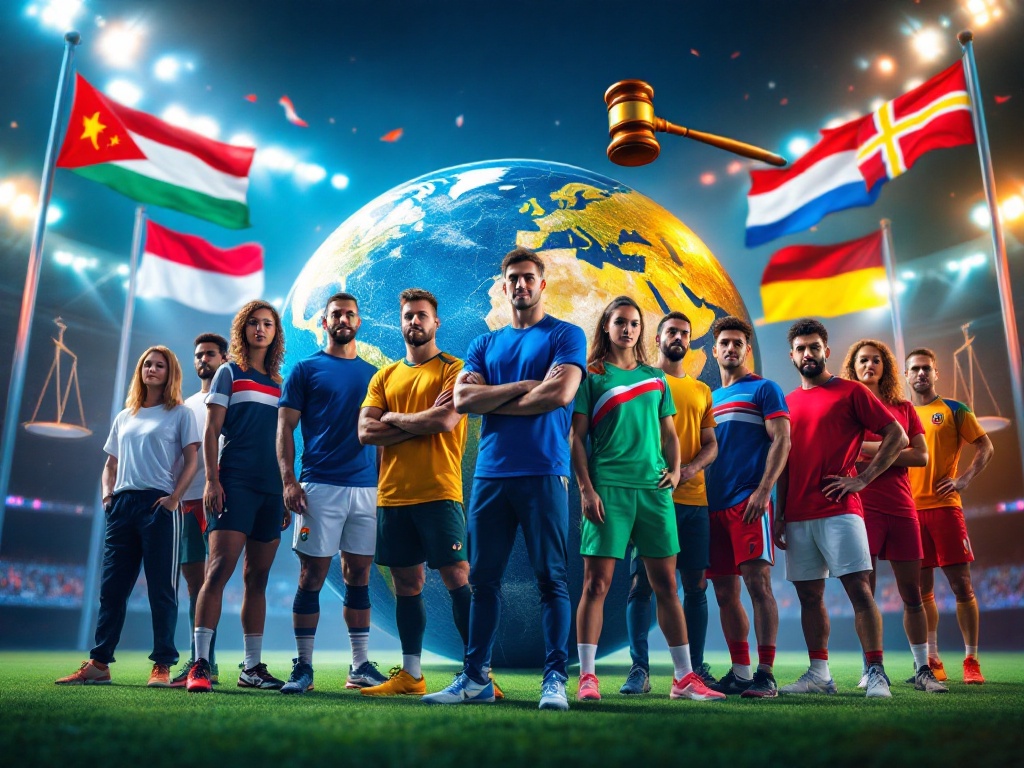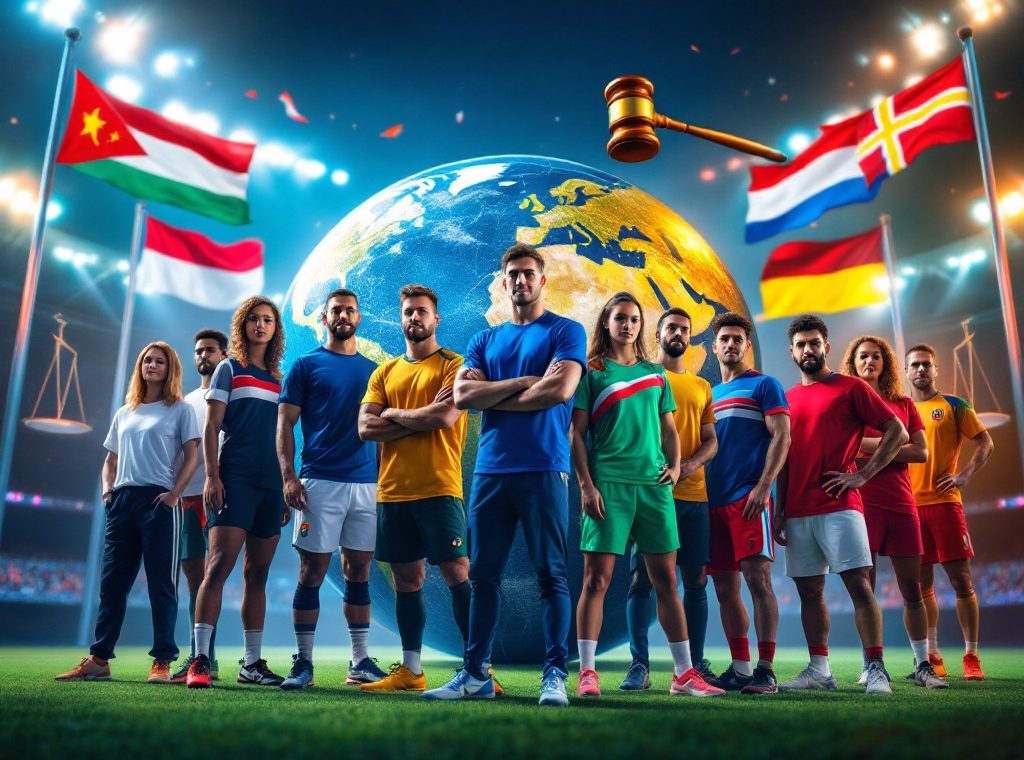Legal Requirements for Competing Internationally
Want to compete internationally? Navigating the legal landscape of international sports is crucial for athletes and businesses. From dual citizenship and IOC regulations to antitrust laws and export controls, this article breaks down the essential legal frameworks you need to know. Understanding these rules is vital for eligibility, fair play, and avoiding sanctions. Discover how international agreements, jurisdictional boundaries, and regulatory reviews impact athletes and businesses. Dive in to ensure your international sporting endeavors are successful and compliant.
Important information

- International athletic competition involves navigating complex eligibility rules set by the IOC, IFs, and NOCs, including nationality, residency, and performance standards.
- Athletes must adhere to the World Anti-Doping Code and their sport’s specific regulations, with non-compliance leading to severe penalties like sanctions and ineligibility.
- Competition and antitrust laws are crucial for fair play, preventing monopolies and ensuring a level playing field. These regulations protect athletes and the integrity of the games.
- Dual citizenship offers athletes more sponsorship opportunities and training access but requires navigating varying competition rules and economic regulations of different countries.
- International sports businesses must comply with national, international, and sports-specific laws, including athlete eligibility verification and export controls impacting trade.
Understanding Legal Requirements for Competing Internationally
Athletes participating in international competitions often require a second citizenship. While the International Olympic Committee (IOC) verifies adherence to the Olympic Charter’s nationality rules, each International Federation (IF) and National Olympic Committee (NOC) establishes its own eligibility criteria. These criteria encompass nationality, residency requirements, and performance benchmarks. This complex landscape requires careful navigation by athletes aiming to compete globally.
Key Legal Frameworks and International Agreements
The International Olympic Committee (IOC) establishes the rules governing global competitions. These rules include athlete eligibility, particularly for dual citizens, allowing athletes to represent the country best suited to their aspirations. All athletes must adhere to the World Anti-Doping Code and the specific regulations of their chosen sport. International sports organizations, such as FIFA (soccer) and FIBA (basketball), maintain their own rules. These rules cover competition formats, equipment standards, and disciplinary procedures, ensuring fair play and a level playing field.
Role of Competition Law and Antitrust Law
Competition and antitrust laws are crucial for maintaining fair play in international sports. These regulations ensure a level playing field for all athletes and protect the integrity of the games. Adhering to these rules is essential for athletes to maintain their eligibility and represent their countries. Non-compliance can result in severe consequences, including sanctions affecting citizenship and prohibiting participation in international events. For example, athletes must comply with sponsorship, endorsement, and representation agreements. These laws prevent monopolies, cartels, and other anti-competitive practices that could harm athletes or distort fair competition. These legal frameworks are essential for upholding the principles of fair play in sports.
Antitrust Laws and International Enforcement
Navigating antitrust laws is complex in today’s global marketplace. Countries often apply their own regulations to business activities occurring abroad if those actions affect their domestic commerce—a concept known as extraterritorial jurisdiction. International collaboration is essential, with countries sharing information about antitrust concerns through bilateral agreements and other cooperative efforts. Enforcement typically begins with investigations, where regulators examine potential violations and may impose penalties. Mergers and acquisitions, along with potentially anti-competitive business strategies, face careful scrutiny. Here’s a breakdown of key aspects:
Extraterritorial Jurisdiction
Many countries assert jurisdiction over anti-competitive conduct outside their borders if it impacts their domestic markets. This can lead to companies facing scrutiny from multiple jurisdictions for the same activities.
International Collaboration
Given the global nature of commerce, international cooperation is crucial for effective antitrust enforcement. Information sharing and coordinated investigations are becoming increasingly common.
Enforcement and Investigations
Antitrust regulators have broad investigative powers. They can demand documents, conduct interviews, and ultimately impose significant penalties for violations.
Mergers and Acquisitions
Large mergers and acquisitions undergo rigorous antitrust review to ensure they don’t stifle competition or create monopolies.
Jurisdictional Boundaries and Extraterritorial Jurisdiction
Extraterritorial jurisdiction occurs when a country’s laws apply outside its physical borders. This can significantly impact global competition, as seen with the International Olympic Committee (IOC). The IOC sets guidelines for athlete eligibility and country representation, navigating jurisdictional complexities. Athletes with dual citizenship can choose their represented country, adhering to IOC regulations.
International Cooperation and Bilateral Agreements
International cooperation offers several key benefits for athletes, simplifying travel and competition logistics. Bilateral agreements streamline participation in international events, often easing visa and work permit processes. Dual citizenship provides additional advantages, simplifying travel and broadening training access while allowing athletes to represent either nation. This expands opportunities for athletes and strengthens global sports connections.
Antitrust Enforcement and Regulatory Review
Antitrust laws promote fair competition in sports, and regulatory oversight ensures this fairness is maintained. Eligibility checks for international events often involve reviewing athletes’ citizenship and the quality of their representation to guarantee a level playing field.
International Expansion and Legal Challenges
Expanding internationally presents significant legal hurdles for businesses. Companies must navigate a complex web of foreign regulations, including local laws, trade rules, and labor standards. Harmonizing with international competition laws adds another layer of complexity. Antitrust regulations differ significantly between countries, making compliance challenging for multinational companies. Successfully navigating this landscape requires a deep understanding of both local and international legal frameworks, as well as careful consideration of potential jurisdictional conflicts. Therefore, meticulous legal planning is essential for international expansion. Here’s a breakdown of key legal aspects to consider:
Local Regulations
Thoroughly research and understand the specific laws and regulations of each target market. This includes everything from corporate formation and taxation to product safety and consumer protection. Failure to comply with local laws can result in penalties, legal disputes, and damage to your brand reputation.
International Agreements
Be aware of international treaties and agreements that may impact your operations. These agreements can cover areas like intellectual property, trade, and investment. Understanding these agreements is crucial for avoiding legal conflicts and ensuring smooth cross-border operations.
Competition Laws
Pay close attention to antitrust and competition laws in each jurisdiction. These regulations vary significantly between countries and can be complex to navigate. Ensure your business practices adhere to these laws to avoid investigations, fines, and legal repercussions.
Labor Standards
Familiarize yourself with local labor laws, including minimum wage, working conditions, and employee rights. Complying with these standards is crucial for ethical operations and avoiding legal disputes. It also helps foster positive relationships with employees and local communities.
Foreign Jurisdictions and Market Economy Regulations
Dual citizenship presents both opportunities and challenges for athletes in international athletic competition. Athletes with dual citizenship often have a wider range of sponsorship opportunities, increasing their market value by seeking sponsors in multiple countries. However, navigating the diverse economic regulations and tax laws of different nations can be complex. Additionally, athletes must carefully consider the varying competition eligibility rules of each country.
Harmonization of Competition Laws Across Borders
Global cooperation on competition law simplifies the regulatory landscape for international businesses, reducing legal complexities and promoting fair competition across borders.
Consistent application of antitrust principles prevents conflicting rules in different jurisdictions.
While harmonizing these laws is challenging due to varying legal traditions and enforcement priorities, it fosters a predictable environment that encourages international trade and investment, ultimately benefiting both businesses and consumers.
This creates a level playing field for all.
Multinational Business Enterprises and Compliance
International sports businesses operate within a complex framework of legal rules, including national and international laws, and sports-specific regulations. A key area is athlete eligibility, commonly verified through documents such as passports and birth certificates. Export controls, influenced by national security and foreign policy, add another layer of complexity by restricting the movement of certain goods and technologies. These controls significantly impact international trade, affecting what sports businesses can and cannot transport across borders.
Legal Framework
International sports businesses are governed by a complex interplay of:
- National laws,
- International laws, and
- Sports-specific regulations.
Athlete Eligibility
Athlete eligibility is a crucial aspect, typically verified through documents like:
- Passports, and
- Birth certificates.
Export Controls
Export controls, driven by national security and foreign policy considerations, restrict the movement of specific goods and technologies. This impacts international trade, affecting the import and export activities of sports businesses.












